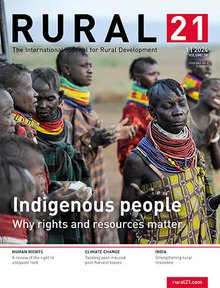Vol. 58 No. 1/2024
Indigenous people – why rights and resources matter
Currently, there are around 477 million indigenous people living in roughly 70 countries across the world. They speak more than 4,000 of the world’s 7,000 languages, and they protect roughly 80 per cent of the world’s remaining biodiversity. But while making up slightly more than six per cent of the global population, indigenous people account for about 15 per cent of the extreme poor, and their life expectancy is up to 20 years lower than that of other population groups.
There are many reasons for this. The great majority of indigenous communities live in remote and fragile environments, with very limited access to basic services, including healthcare, water and sanitation, energy and education. Moreover, territories and natural resources which provide livelihoods for a large number of these people are increasingly under threat – not only from the impact of climate change, but also because of the growing demand for foodstuffs and forest products, fuels and valuable minerals. Violations of rights are a regular occurrence.
Our authors – many of whom belong to Indigenous Peoples – demonstrate which international bodies of law indigenous people can refer to and describe the strengths and weaknesses of tools and instruments which have been developed to enhance their access to justice and development. They show the flipside of the green energy transition and give examples of successful advocacy work. And they report how the valorisation of indigenous knowledge can be achieved – including rewarding people for the valuable ecosystem services they provide.
Click here if you are interested to subscribe
Download edition 2024/01 Focus: "Indigenous people – why rights and resources matter"
Focus
- Between aspiration and reality
- "Brazilian society should be proud to have 305 Indigenous Peoples and 274 indigenous languages"
- Traditional knowledge and intellectual property
- The legacy of colonialism is still there
- Reconciling the green energy transition with the rights of Indigenous Peoples
- FPIC protocols – rebalancing power by changing the rules of the game?
- Haki Ardhi – the women’s land rights reporting tool
- The Indigenous Navigator – data for and by Indigenous Peoples
- Collective efforts for successful advocacy
- Combining indigenous knowledge with meteorological expertise
- Rewarding ecosystem services – an example from Central America




